- Home
- Neal Stephenson
The Mongoliad: Book One Page 2
The Mongoliad: Book One Read online
Page 2
It was an embarrassingly long time before Cnán could hear anything at all. But finally a heavy clop of hooves and jingle of steel penetrated the dense swath of greenery that surrounded the compound, and two riders came up the forest road abreast, each leading a spare horse.
Now here, Cnán thought, was a knight worthy of her mother’s tales. He was tall, with long brown hair swept back from a high forehead, hazel eyes, and the clean-shaven face of an angel. He was armored in a shirt of mail, which she was accustomed to, but over that, guarding his shoulder and his breast, he wore segmented plates of polished steel. Slung over his back was a shield shaped, she sourly guessed, like the teardrops that must have rained from the faces of all the fancy ladies in his castle on the day he had gone prancing off to fight the Mongols. On his hip was a sword made for use in one hand, but straight, double-edged, longer and finer than most such weapons.
The other man was smaller, thick-muscled, and with a head more square than round. At first she assumed he was a squire, but as the pair rode into the compound, she saw he was at least as old as the knight. His clothes, though travel-worn, were more in keeping with courtly life than this forest camp. Something like a hatchet dangled from his waist, and he was festooned with daggers. Across his back was slung a crossbow, drawn and cocked. In his posture and the way he related to the beautiful knight, there was no deference, only equal regard and camaraderie. Coupled with a wry awareness of how people favored his handsome friend.
The knight had eyes only for Feronantus and a courteous greeting seemed ready on his lips, but the courtier with an excess of daggers broke in and was first to speak. He swept his arm ceremonially and announced in a booming voice to the compound: “Christendom is saved! Brother Percival has made a quest of it.”
Laughter from all around, partly at the jest, but partly, Cnán thought, out of relief that these men were on their side.
The knight Percival drew up near Feronantus and dismounted with practiced grace. Finn had been right about his horse. It was a rare, beautiful brute with a white blaze on its forehead and a silky gray mane, barrel-chested, bigger than Istvan’s stallion, and easily twice the size of a Mongol pony.
She had heard tales from her kin-sisters of an altercation between certain brothers of the Teutonic Knights and a party of Mongols who had gone astray and gotten lost in enemy territory. Trapped between river and woods, unable to maneuver as they were wont to, the Mongols had crowded together and the warhorses of the Teutons had slammed their smaller mounts around like bowling pins. Seeing this huge destrier, it was easy to believe. A horse worthy of the man…
Percival bowed low to Feronantus. Cnán was not at all amused at how much pleasure she felt, studying his face. She did her best to make sure it didn’t show.
“Brother Percival, Brother Roger, welcome,” Feronantus said. “It is very good to see you both. Thank God for your safe arrival.”
Percival’s companion, Roger, was only a step behind him. “Truth be told, God was surprisingly unhelpful,” he began. Percival shot him an exasperated look. Side by side, the difference in height between the pair was not as great as she had thought at first; Percival had seemed larger because of his mount.
“We will listen to your stories while we sup,” Feronantus said, holding up a hand to stay further discourse between the two.
“And listen, and listen some more—and listen again!” cracked the big man who had been training Haakon.
Percival turned to look at the source of the jest, and un-feigned delight spread over his face. “Taran! I hoped you’d be here.”
“I heard you might come,” said Taran, “and knew you’d need whipping into shape before the contests begin.”
“Taran you know,” said Feronantus, “and this dark, splendid fellow is Raphael, our physician. There is much we might speak of greetings and tales, but, Roger and Percival, you have interrupted me en route to a meeting, one I’m assured is too important to be delayed.”
Eyes went to Cnán, then back to Feronantus.
“This is our swift-footed guide and messenger,” Feronantus said. “Her name is not important—for now.”
Taran muttered something about Bindings, and then wary interest chased the confusion out of their faces.
“Where did I come from? Places of which you have never heard the names. So there would be little point in my reciting them,” Cnán said, in answer to Feronantus’s first question.
Amusement around the table, only a little strained. She was nervous that the one named Raphael, with the close-cropped black beard and the Syrian look, might call her bluff. A Crusader, she guessed, born and bred in one of the few surviving fortress-cities that the armies of the West still garrisoned in the flyblown hellhole that they styled the Holy Land. But such a man might know the deep parts of Asia better than, say, Taran, who was Irish and probably considered Dublin to be part of the exotic Orient.
Or perhaps she was being unkind. Hunger, and being hunted like an animal, had a way of shortening her temper. She tore into a piece of bread while the three senior knights enjoyed a chuckle.
“But most recently,” she went on, chewing and talking at the same time, “in the last few days, I have traveled from Czeszow. East of here.” She swallowed. “In the forest.” And again. “Where Mongols don’t like to go. There is a man there, a Ruthenian of noble birth, from the city of Volodymyr-Volynskyi—you probably know it as Lodomeria. He says he knows you.”
A serious, pained look came over Feronantus’s face. “Illarion,” he said.
“A member of your Order?”
“No,” said Feronantus, “but he could have been, were it not for…religious controversy.”
“Wrong kind of Christian?” Cnán asked, still chewing.
“Yes. Please go on. Illarion is alive, you say?”
“You seem surprised,” Cnán observed, “which tells me that you must have heard tell of what happened at Lodomeria.”
Feronantus’s silence implied assent. But Taran only looked provoked. “I have not heard,” said the Irishman.
“Briefly, the same as happened to all other cities that stand in the way of the Mongols. Perhaps worse than usual.”
“How did Illarion escape? He is not the sort to run away.”
“Aye, your judgment of his character is sound,” Cnán said. “He stood and fought. Was captured, along with many others of that city’s noble class, as well as clergy, merchants, and so forth. Mongols do not like to shed the blood of captives. It’s fine on the battlefield, of necessity, but they prefer to put prisoners to death bloodlessly. If it’s only one, or a few, they bring out a wrestler who breaks the spine. But that’s too slow for large numbers. So they bind their captives and force them to lie down in an open field, like a human carpet. While the poor people moan and plead, over this the Mongols throw planks, making a heaving floor. Then they ride their horses up onto the floor—though the ponies like it not a whit—and ride them back and forth…over and over…until the crying and moaning stops. The Mongols bray and babble and toast each other with their foul milk. Their young watch and dance like imps in hell. It’s a fine party,” she spat, and her eyes darted around the astonished circle. She put down her bread. “By the time the party’s over, most of the prisoners have been trampled to death. The ones who survive are too broken to move. Mostly dead, mostly broken,” she added, fingering the bread again. Her stomach twitched and she shook her head. “Enough.”
“This happened to Illarion?”
“Yes. And his wife and daughter. The next morning, while Onghwe Khan and his men were sleeping it off, a few black bones came around—”
“Black bones?” Feronantus asked.
“Mongols of lower caste. Tartars, Turks, some Ruthenians. They came to pull up the planks and take ears.”
“Ears?” Taran asked sharply.
Raphael explained, “It is how they count the enemy dead.”
“Most of us have two ears!” Taran protested.
“It is always
the right ear,” Raphael said gently.
“When they cut off Illarion’s right ear, he woke up,” Cnán said. “Reached up like a demon out of the muck, snatched the knife from the ear-cutter, twisted it around, and gutted him. A few other black bones bandied their bowlegs his way. He picked up a plank and used it like a quarterstaff. Brained them one by one. Killed them all.”
This cheered her a little, and she took another bite. “Collected their horses and rode away. Do you have beer?”
The knights looked at each other and smiled as if at a secret. Raphael poured her a glass of the foaming sour stuff they had been drinking. It tasted like beer but was as strong as mead and made her head swim.
“Since Illarion still lives, I cannot simply dismiss the story,” said Feronantus, after thinking about it for as long as he wanted to, “but I suspect it to be half true and half nonsense.”
“Plank as quarterstaff,” Taran said, tugging mightily at his beard and screwing up his face. “Difficult to get a proper grip.”
“Illarion was always good with a staff,” Feronantus reminded him.
“I doubt that the ear-taker woke him,” Raphael said. “He was probably lying in wait, feigning death.”
“His ear is definitely gone,” Cnán announced. “His right ear.”
“We needn’t resolve such questions now,” said Feronantus, as Taran seemed about to voice a new objection. “You say he is alive, and nearby.”
“Barely, and in a manner of speaking,” said Cnán. “Two days’ ride under normal circumstances.”
“I love Illarion,” Feronantus admitted freely, “and would do almost anything for him. But there are only a few of us, and we are here for another purpose.”
“He said you would say that,” said Cnán, “and you should come and get him anyway, and that you would understand when he got here.”
Feronantus looked mildly put out. He gave Cnán a searching look. “You would lead us to him?”
“Of course, if you let me finish this bread. And give me more beer.”
“Please, eat your fill. Raphael, will you go and tend to Illarion’s wound?”
“Of course.”
“Take Finn and, in case there’s trouble, Haakon.”
“We might need Haakon here,” Taran warned. Cnán wondered why they needed the boy. He was feckless and clumsy looking. She almost felt sorry for him.
“Raphael will bring him back safe and sound,” Feronantus returned, shifting his gaze to the Syrian.
CHAPTER 2:
THE KHAN OF KHANS
Ögedei, Khan of Khans, third son of Genghis the Great Conqueror, sat upon his throne. His mighty frame was draped in fine robes—delicate embroidery depicted clouds and dragons in pure-gold thread on a sky-blue background. Around him were the lavishly painted walls of the Great Palace of Karakorum. The lilting music of zithers filled the room, and lithe girls danced about the tall throne, their sheer silk sleeves twirling red spirals in the air. Ögedei divided his attention between listening to the petitions of the bureaucrat prostrated before him and playing with his empty cup. He spun the cup deftly in his broad right hand, tracing the delicate silverwork with his fingertips. The cup was empty. He did not wish it to remain empty.
“O Khagan, Master of the World,” said the Shanxi provincial sub-administrator, his fat forehead firmly planted against the floor, “I bring myself before you today to humbly request that the grain taxes for Xieliang County be lowered from one in twelve bushels to one in fifteen…” The beaded tassels on the top of his cap dangled back and forth as he talked, and Ögedei found the motion mesmerizing. He was well into the embrace of the wine, and his mind was easily snared.
Weak, he thought, staring at the tassel-topped sub-administrator. A life hunched over books and papers. Any simple peasant among his subjects could subdue him and choke the breath from his throat, yet he governs them completely. He studied the man, his ludicrous hat, his soft, fat hands. One blow, he reckoned, I could split his head in two with one stroke, and then he could bother me no more. Ögedei sighed and looked away. One hand idly stroked his mustache, while he traced the grooves and ridges on the cup with the other. But another would just take his place, and after him, another. Like swatting at a swarm of flies.
The Shanxi provincial sub-administrator twisted his neck to look up at the Khagan, expecting an answer to a question Ögedei had only half heard. He grew pale, seeing the twisted line of Ögedei’s mouth, and he started to stammer, the tassels bobbing up and down.
Ögedei cut him off with a grunt and a wave of his hand. “Let it be thus,” he said.
The tassels clattered against the floor as the sub-administrator groveled in gratitude. Praising the magnificent wisdom of the Khagan, he shuffled backward until he was far enough away to flee the throne room without causing offense.
The sub-administrator scuttled between a pair of men entering the throne room. One was Yelu Chucai, Ögedei’s advisor; the other was a young warrior, wearing dust-covered leather armor. Chucai strode across the room, a floating apparition in his black silk robes. His beard, as dark as his robes, trailed down to his waist, a not-inconsiderable distance of his seven-foot frame. The young warrior looked small next to Chucai, even though the crown of his head was in line with the other man’s shoulder. The warrior’s eyes were wide, his boyishly smooth face unable to hide his wonderment at the array of treasures arranged in the throne room. Chucai knelt before the Khagan, and the young man belatedly scrambled to follow his lead.
“Khagan,” said Chucai, “this envoy comes from Chagatai Khan.”
Ögedei studied the young man kneeling beside Chucai. Why has my brother sent an emissary? He tried to recall the last report from the noyon, his generals in the field. Batu, Jochi’s intemperate son, was still in the West, expanding the edge of the empire with the aid of Subutai, Genghis’s brilliant strategist. Kadan and Onghwe were with the great horde as well; conquering lands for their father was a worthy cure for the boredom that had consumed them at Karakorum. Chagatai’s holdings—given to him by Genghis—extended from the Altai Mountains to the Amu Darya River. As long as Batu—and, by extension, the rest of Jochi’s offspring—kept conquering lands to the west, there should be no conflict between the two branches of the family. What more could Chagatai want?
The nagging question gave birth to a wine-spawned idea: the possibility of sending the warrior away, dismissing him outright without giving him a hearing.
“Why has my brother sent you?” Ögedei sighed, putting aside the idle idea.
The emissary started. “I…” he stuttered. “Chagatai Khan has sent me to…” He looked up at Ögedei, and the Khagan saw both confusion and something else in the young man’s face. “I have been sent to ensure your safety.”
“Safety?” Ögedei echoed. A scattering of half-formed thoughts raced through his head, a confusion of trails that looped back on themselves. Who? He raised his head and looked around the room. Oil lamps illuminated every inch of the walls; there were no shadows, no places for assassins to hide. There were a handful of men at every door throughout the palace, and hundreds more—thousands—who would die for him at but a word. How much safer could this one man make him? “An assassin?” he sneered, the wine slurring his words.
“No, great Khagan,” the emissary spoke quickly, attempting to redirect the conversation. “Who would be so foolish to try to assassinate you? Chagatai Khan sends me to…” The emissary glanced at Chucai, and seeing no help in the advisor’s hooded gaze, plunged on. “Your brother worries about you, about your drinking. He has sent me to…to watch over you…and…and to make sure you do not drink more than a single cup a day.”
Ögedei stared at the emissary for a long time, long enough that even Chucai started to fidget. The young man looked out of place—a warrior more at ease on the steppes than in the halls of Karakorum, a man who did not like the roof over his head—but there was something about the way he held himself, about the way his eyes moved about the room.
From deep in Ögedei’s belly a rumbling sound rose, a laugh that shook his shoulders and made his robes tremble. “My drinking? My brother is concerned about how much I drink?” He swiped a hand across his mustache, and noticing his cup on the arm of his throne, he picked it up and threw it at the young emissary. The warrior had the presence of mind to not flinch as it bounced off his leather jerkin, dust rising from the impact. “My brother dotes on me like a brood mare.” He stood, looming over the two men, and the last vestige of the laugh became a booming echo in his voice. “I am Ögedei, Khagan of the Mongol Empire. I do as I please. My brother’s attention should be on the kingdoms he can conquer in my name, like his nephew Batu. Like my sons. The rest does not concern him.”
The wine was making his legs wobble, and Ögedei put a hand down on the arm of his throne to steady himself.
The emissary’s face tightened as he watched the Khagan. “It will be as you say, Khagan.” He offered a shallow bow and then turned away from the Khagan, showing Ögedei his back as he walked out of the throne room.
Ögedei collapsed into his throne, a hot flush rushing up his neck. How dare he walk away like that? Gripping the arms of his throne, he pulled himself upright to yell at his guards.
Chucai had not moved, and the stormy expression on his face was enough to quell the shout rising in Ögedei’s throat. The wine fought him too, muddling his vision and making it seem as if dark shadows swam behind his advisor. Shadows that could contain…
“I will speak with him,” Chucai said. Before Ögedei could argue, Chucai offered a perfunctory bow and went after the emissary, leaving the Khagan to brood on his throne.

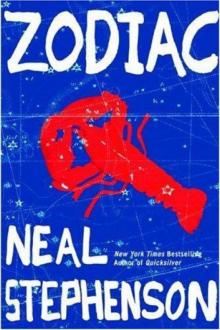 Zodiac: The Eco-Thriller
Zodiac: The Eco-Thriller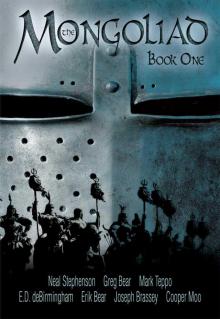 The Mongoliad: Book One
The Mongoliad: Book One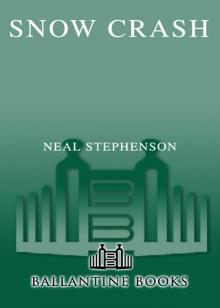 Snow Crash
Snow Crash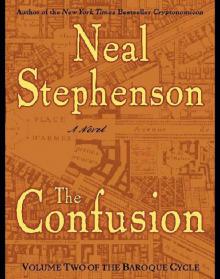 The Confusion: Volume Two of the Baroque Cycle
The Confusion: Volume Two of the Baroque Cycle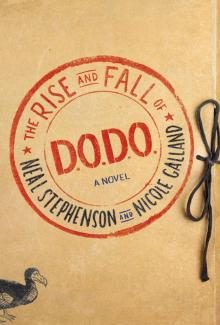 The Rise and Fall of D.O.D.O.
The Rise and Fall of D.O.D.O.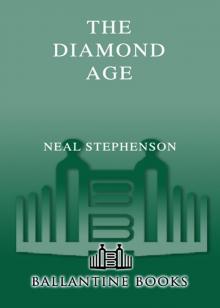 The Diamond Age: Or, a Young Lady's Illustrated Primer
The Diamond Age: Or, a Young Lady's Illustrated Primer The Big U
The Big U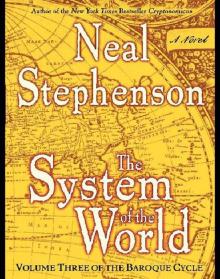 The System of the World: Volume Three of the Baroque Cycle
The System of the World: Volume Three of the Baroque Cycle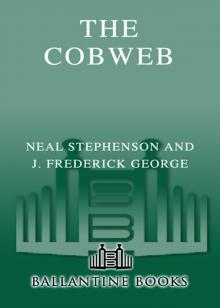 The Cobweb
The Cobweb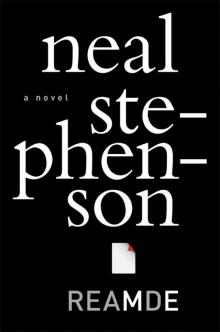 Reamde
Reamde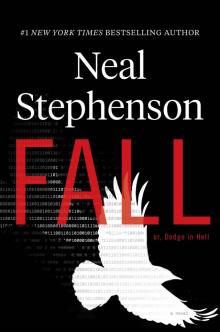 Fall; or, Dodge in Hell
Fall; or, Dodge in Hell Interface
Interface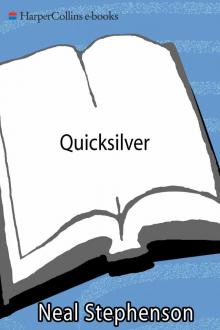 Quicksilver
Quicksilver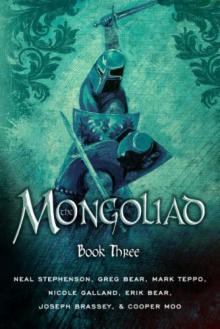 The Mongoliad: Book Three
The Mongoliad: Book Three Seveneves
Seveneves Atmosphæra Incognita
Atmosphæra Incognita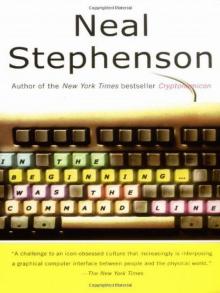 In the Beginning...Was the Command Line
In the Beginning...Was the Command Line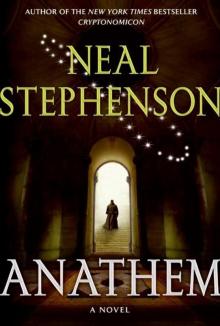 Anathem
Anathem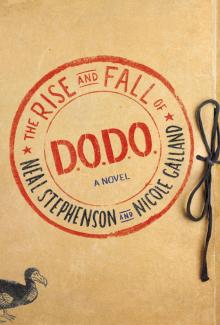 The Rise and Fall of D.O.D.O.: A Novel
The Rise and Fall of D.O.D.O.: A Novel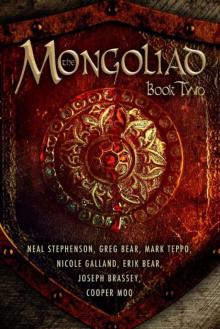 The Mongoliad: Book Two
The Mongoliad: Book Two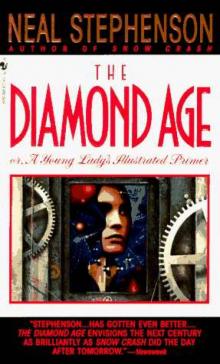 Diamond Age or a Young Lady's Illustrated Primer
Diamond Age or a Young Lady's Illustrated Primer THE System OF THE WORLD
THE System OF THE WORLD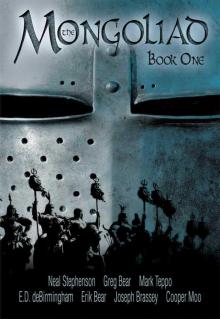 The Mongoliad: Book One tfs-1
The Mongoliad: Book One tfs-1 Some Remarks: Essays and Other Writing
Some Remarks: Essays and Other Writing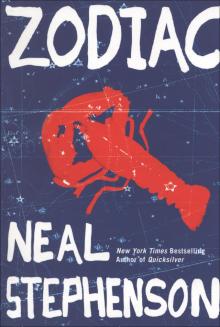 Zodiac
Zodiac Spew
Spew The Baroque Cycle: Quicksilver, the Confusion, and the System of the World
The Baroque Cycle: Quicksilver, the Confusion, and the System of the World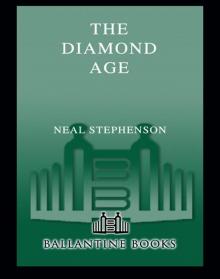 The Diamond Age
The Diamond Age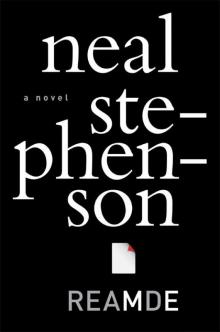 Reamde: A Novel
Reamde: A Novel In the Kingdom of Mao Bell
In the Kingdom of Mao Bell Mother Earth Mother Board
Mother Earth Mother Board Twelve Tomorrows - Visionary stories of the near future inspired by today's technologies
Twelve Tomorrows - Visionary stories of the near future inspired by today's technologies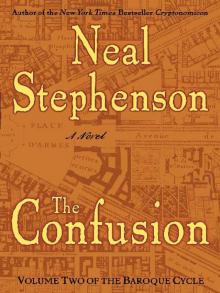 The Confusion
The Confusion The Great Simoleon Caper
The Great Simoleon Caper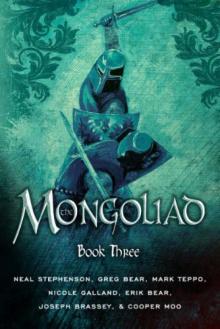 The Mongoliad: Book Three tfs-3
The Mongoliad: Book Three tfs-3